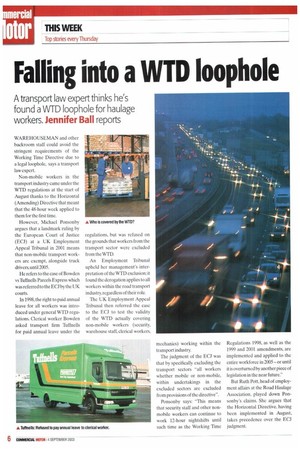Falling into a WTD loophole
Page 6

If you've noticed an error in this article please click here to report it so we can fix it.
A transport law expert thinks he's found a WTD loophole for haulage workers. Jennifer Ball reports WAREHOUSEMAN and other backroom staff could avoid the stringent requirements of the Working Time Directive due to a legal loophole, says a transport law expert.
Non-mobile workers in the transport industry came under the WTD regulations at the start of August thanks to the Horizontal (Amending) Directive that meant that the 48-hour week applied to them for the first time.
However. Michael Ponsonby argues that a landmark ruling by the European Court of Justice (ECJ) at a UK Employment Appeal Tribunal in 2001 means that non-mobile transport workers are exempt, alongside truck drivers, until 2005.
He refers to the case of Bowden vs Tuffnells Parcels Express which was referred to the ECJ by the UK courts.
In 1998, the right to paid annual leave for all workers was introduced under general WTD regulations. Clerical worker Bowden asked transport firm Tuffnells for paid annual leave under the regulations, but was refused on the grounds that workers from the transport sector were excluded from the WTD.
An Employment Tribunal upheld her management's interpretation of the WTD exclusion; it found the derogation applies to all workers within the road transport industry, regardless of their role.
The UK Employment Appeal Tribunal then referred the case to the ECJ to test the validity of the WTD actually covering non-mobile workers (security, warehouse staff, clerical workers, mechanics) working within the transport industry.
The judgment of the ECJ was that by specifically excluding the transport sectors "all workers whether mobile or non-mobile, within undertakings in the excluded sectors are excluded from provisions of the directive".
Ponsonby says: "This means that security staff and other nonmobile workers can continue to work 12-hour nightshifts until such time as the Working Time Regulations 1998, as well as the 1999 and 2001 amendments, are implemented and applied to the entire workforce in 2005 — or until it is overturned by another piece of legislation in the near future."
But Ruth Pott, head of employment affairs at the Road Haulage Association, played down Ponsonby 's claims. She argues that the Horizontal Directive, having been implemented in August, takes precedence over the EC...I judgment.
















































































































































































































